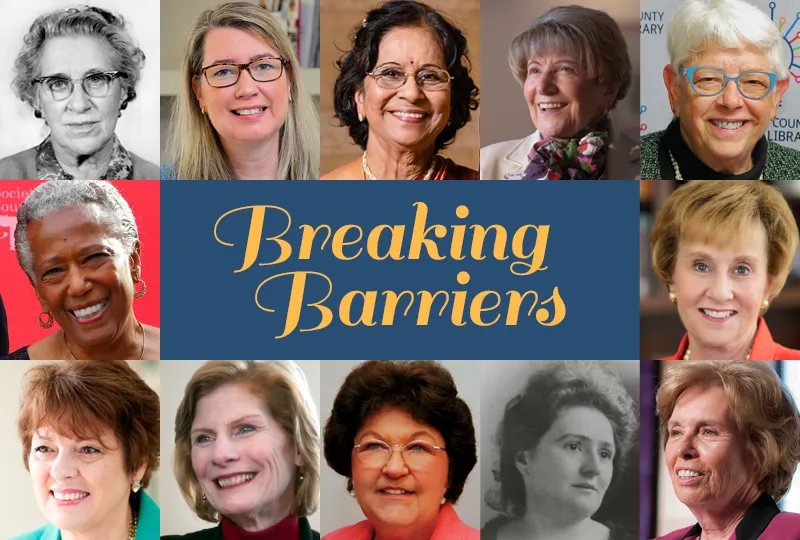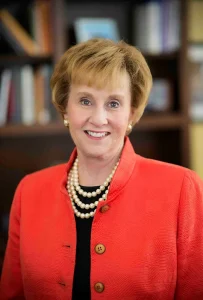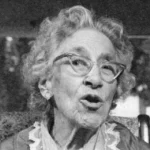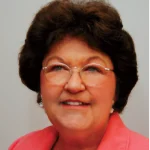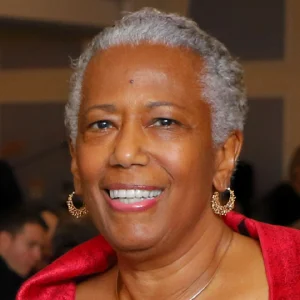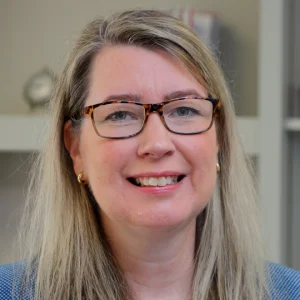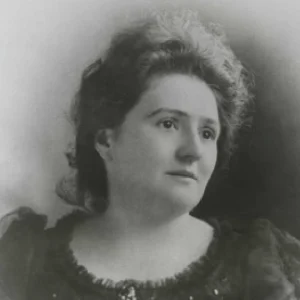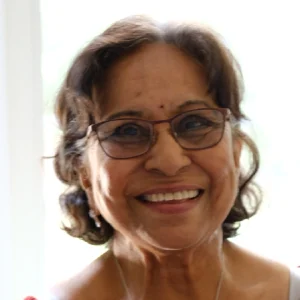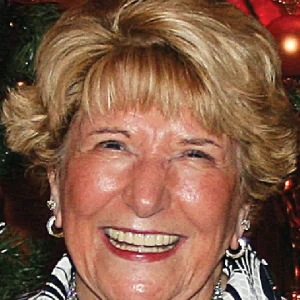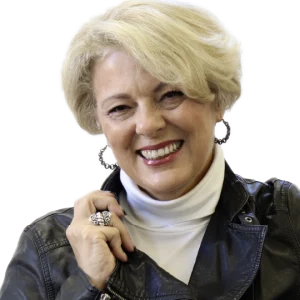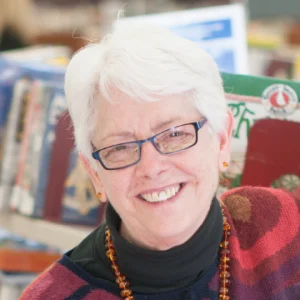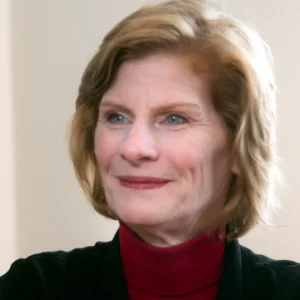TOP ROW 1: Dorothy Elderdice (Photo supplied by HSCC), Cynthia McCabe (Photo by Nikola Tzenov), Vimala Naganna (Photo by Mary Brunst), Faye Pappalardo (Photo by Walter P. Calahan), Lynn Wheeler (Photo by Nikola Tzenov)
ROW 2: Virginia Harrison (Photo by Nikola Tzenov), Joan Develin Coley (Photo supplied by McDaniel College)
ROW 3: Leslie Simmons (Photo by Walter P. Calahan), Roberta Windham (Photo by Walter P. Calahan), Julia Gouge, Sadie Kneller Miller, Paula Langmead (Photo by Walter P. Calahan)
by Linda L. Esterson
Women Breaking Barriers: Honoring Women Who Blazed A Trail For Opportunities in Carroll Counry
Women in Carroll County have access to a wealth of personal and professional opportunities thanks to the trailblazers who paved the way before them. Modern and not-so-modern pioneers have broken down barriers and created a culture of inclusion and empowerment that continues to benefit women today. As a result, young women entering the workforce find themselves with more role models, mentors, and support systems than ever before, allowing them to pursue careers once dominated by men. While it would be impossible to shine a light on all the women who have broken down barriers over the years, we are thrilled to share a few stories of women who have achieved significant firsts in Carroll.
Mary Bostwick Shellman
Leading the Charge for Women’s Rights
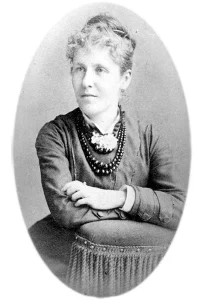 Next spring, the Historical Society of Carroll County will open an exhibit honoring Mary Bostwick Shellman, a leader of the suffrage movement in Maryland in the 1920s. The exhibit will serve as a retrospective of her life as a teenage girl living in Westminster through the Civil War, experiencing the turn of the 20th century and becoming a suffrage movement leader until her death in 1938.
Next spring, the Historical Society of Carroll County will open an exhibit honoring Mary Bostwick Shellman, a leader of the suffrage movement in Maryland in the 1920s. The exhibit will serve as a retrospective of her life as a teenage girl living in Westminster through the Civil War, experiencing the turn of the 20th century and becoming a suffrage movement leader until her death in 1938.
“She was probably one of the most prominent residents of the Sherman-Fisher-Shellman House,” notes Jason Illari, executive director of the Historical Society of Carroll County. According to Illari, Shellman was the last family member to own the historic home, and the exhibit will comprise a bedroom that will depict what her life was like living there. The Historical Society bought the house in a public auction in 1939.
“We want to bring more attention to the impact she made on a lot of social causes not only in Carroll County but also the regional impacts of her work,” Illari explains. “She was a real incubator of different groups and causes in Carroll County, and we believe her story should be fully told.”
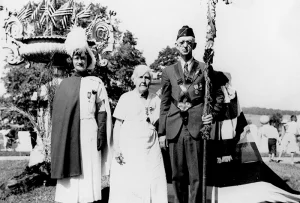
Mary Shellman with Gladys Wimert and Albert Mitten at the Memorial Day services in Westminster Cemetery, 1937. Miss Shellman returned to Westminster from her home in Rockport, Texas, for Carroll County’s centennial celebration. It was her last visit to Westminster.
The exhibit will take the form of a new period room in the Sherman-Fisher-Shellman House and will be called Mary Shellman: Civil War to Suffrage. The room will feature never-before-seen artifacts and manuscripts from her life that highlight her story describing a young woman witnessing the impacts of the Civil War to becoming a leader of the suffragist movement.
Among her credits was her involvement in the League of Women Voters. She was instrumental in bringing the telephone to Westminster, with the first telephone in the county installed in the upstairs of the Sherman-Fisher-Shellman House. She met Alexander Graham Bell when he visited to inspect the telephone system. He approached her at the Sherman-Fisher-Shellman House office, and she kept the small gold and jet telephone he had gifted her. In addition, she helped organize the Boy Scouts of Westminster and Carroll County. She may be most known for founding the Memorial Day Parade in Westminster in 1868, one of the oldest and longest Memorial Day parades in the United States, according to Illari.
Historical Society accounts include an anecdote about her work for the Boy Scouts. After a year of service, she was dismissed by leaders at headquarters after they discovered she was a woman. In her reply to her dismissal, she wrote, “I can’t vote because I am still classed with idiots, criminals and the insane. But be honest, gentlemen, don’t you think that after fooling a lot of wise men a whole year into thinking I was a man, I am capable of handling the vote when I do get it?”
Shellman also served political reform organizations such as the Civic League and the Woman’s Christian Temperance Union, the Just Government League and the League of Republican Women of Maryland.
“She represents a lot of that change that was happening in the early 20th century in Carroll County, technological and social changes,” Illari continues. “She provides a representation of that.”
The new exhibit’s ribbon-cutting event is planned for the spring of 2025. It is funded through a grant from the Heart of the Civil War Heritage Area.
Joan Develin Coley
Mapping Out a New Path for a Local College
Joan Develin Coley, Ph.D., was the first female college president in Carroll County, serving Western Maryland College, now known as McDaniel College, for a decade after climbing up the ranks from a faculty position. Her main accomplishment, she says, was spearheading the name change in 2002, honoring William Roberts McDaniel, who served the school as a student, professor, vice president, acting president, treasurer and trustee from 1870 to 1942.
“McDaniel was an important figure in the early history of the college, and so it was a name that people coalesced around,” she recalls. “We had a lot of names suggested … and it was a perfect name for us.”
Although some alumni and students at the time disagreed with changing the name, she felt it was more than necessary during a time when college admissions became more competitive in the marketplace.
“The name Western Maryland College made the college sound like a public institution, which it is not, and it made it sound like it was located in a part of the state where it was not,” she says. “If you have a geographic locator, it’s like you’re less than the flagship.”
Following the name-change vote, admissions staff traveling the country found potential students more receptive, and the number of applications grew significantly.
Coley’s path to the top position was far from traditional. Growing up, she recalls her younger twin brothers were expected to attend college, although the same was not assumed for her. The expectation in 1962 was for her, like most girls, to become a secretary. But she aspired to teach second grade, and she knew she needed a college education. A school guidance counselor arranged a trip to Albright College in Reading, Pennsylvania. While she earned a scholarship, she also had to work to pay the rest of her expenses.
Working prevented her from student teaching, and thus, she was unable to earn a teaching certification. When she applied for her first job, she was told she needed to complete a master’s degree to become certified. She agreed, but she didn’t stop there.
“I then ended up with a Ph.D.,” she says. “It wasn’t that I was driven to do all these things. They were just things that I needed to do my job. I have a strong work ethic, and if I was meant to do them, then I would do them.”
After she retired from serving as president of McDaniel College, she was asked to serve as interim president of Notre Dame of Maryland University in Baltimore and went on to work as a consultant for higher education administrators. She stepped back during the COVID-19 pandemic. Today, she’s retired alongside her husband of 18 years, M. Lee Rice, a former McDaniel board of directors member during her tenure.
Humbly reflecting on her accomplishments, Coley cites the name change as more important than serving as the first female president. Her advice to today’s youth – not just girls – is to work hard and “follow your bliss, follow your talent, follow a path that makes you excited, and do what’s right for you.”
Paula Langmead
Removing the Stigma Associated With Mental Health
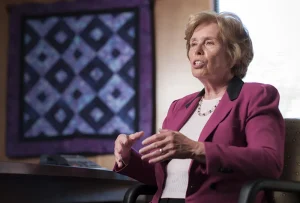
Paula Langmead from her Q&A article in Carroll Magazine’s June/July 2013 issue. Photo by Walter P. Calahan
After serving as acting superintendent for more than a year, Paula Langmead was named superintendent of Springfield Hospital Center in Sykesville in 1994. In doing so, she became the first female mental health facility chief executive in Carroll County, and possibly the state of Maryland.
“I never thought of myself as ‘breaking barriers,’ as much as I always felt the need to be an active member of this community to understand the culture of it and to make myself available wherever there was a need,” she explains. “I continually felt a need to improve the community’s understanding of the mentally ill and the effects this poses to families and our community.”
Langmead worked at Springfield for 40 years. She strived to ensure that all patients were respected, supported and treated with medication and therapy to move forward to enhanced lives in the community, she explains. Early in her tenure, the Eva Salomon Building and the Hitchman Building opened, providing a modern environment that incorporated the latest mental health therapies of that time.
In 2001, Langmead was the first woman appointed to the Carroll Hospital Center board of directors. She recalls it being an “exceptional” experience, with the male board members treating her with respect and acknowledging her dedication, intelligence and drive to “move things forward.” She also served on other boards including Carroll Community College Foundation, Carroll Lutheran Village, the Community Foundation of Carroll County, Carroll County Chamber of Commerce and the United Way of Central Maryland.
“In those days, I think everybody was looking at our communities, our young people, and saying, ‘What can we do to make Carroll County [and] the state of Maryland embrace education, embrace health care, embrace mental health and collaborate on the new treatments that were coming out and accepting them?’ I feel we got rid of the stigma that was on mental health and mental health facilities in the state and in particular Carroll County.”
Her focus on dignity and respect for the hospital’s patients led her to secure burial sites for patients who passed away while at the hospital. A bronze plaque honored each patient. A special ceremony in the 1980s opened the burial ground.
“At that ceremony, many people from the state came to see what we had done, how we had done it and [how we were] just trying to change in little ways like that, to make these people be real,” she recalls. “Their lives were in Carroll County, and they were good, honest people that needed to be honored at the time of their death.”
“I never thought of myself as ‘breaking barriers,’ as much as I always felt the need to be an active member of this community to understand the culture of it and to make myself available wherever there was a need. I continually felt a need to improve the community’s understanding of the mentally ill and the effects this poses to families and our community.” – PAULA LANGMEAD
Other Women Who Have Made or Are Making Significant Contributions to Life in Carroll County
Dorothy Elderdice, born in 1892, was known for advocacy work which included organizing a group of Carroll Countians to join the 1963 March on Washington for Jobs and Freedom. She fought for racial and gender equity in Carroll County and beyond. For many years, she taught speech and drama at Westminster Theological Seminary located on the Western Maryland College (now McDaniel College) campus and directed the Westminster Community Players, which eventually became The Carroll Players.
Julia Gouge was the first female county commissioner in Carroll County, serving from 1986-1994 and 1998-2010. She previously served as town councilwoman and mayor of Hampstead and was the county’s first female mayor. She also was the first Republican female president of the Maryland Association of Counties (MACo).
Virginia Harrison was the first Black woman to serve on Carroll County’s Board of Education. After leaving a communications position with the FBI to raise her kids, she started a dressmaking business and became active with a host of organizations, including Carroll Citizens for Racial Equity, the NAACP, the Community Media Center, Common Ground on the Hill and the Boys & Girls Clubs of Carroll County.
Cynthia McCabe, Ed.D., just began her third year as Carroll County’s first female superintendent of schools. She leads Maryland’s 10th-largest school system with more than 25,000 students and 3,300 employees.
Sadie Kneller Miller, was born in Westminster, graduated from Western Maryland College in 1885 and became known as “the only woman baseball reporter in the country” for her work that included covering the Baltimore Orioles. She was also skilled with a camera and in her decades-long career, covered everything from the Baltimore fire of 1904 to the gold rush of the Yukon, to the sinking of the Maine in 1912. She is now highly recognized as the best-known and most adventurous writer and photojournalist of her time.
Vimala Naganna, M.D., is a physician practicing in Carroll County. Together with her late husband, Chitra, the couple has been committed to the well-being of their patients and caring for the broader community since the 1970s. They made a $1 million gift to the Boys & Girls Clubs of Carroll County, established an endowed scholarship for nursing and physical therapy assistant program students, and helped create the Greater Baltimore Hindu-Jain Temple in Finksburg.
Faye Pappalardo, Ph.D., became the first female president of Carroll Community College in 1999 and led its surge to a leading independent community college in Maryland. She served for 15 years, prioritizing student success through new programs and curriculum.
Leslie Simmons, RN, FACHE, is the system chief operating officer and executive vice president of LifeBridge Health. As the former president and CEO of Carroll Hospital Center, Simmons spearheaded the hospital’s partnership with LifeBridge Health in July 2014.
Lynn Wheeler served the Carroll County Public Library for 14 years before retiring in 2018. Under her leadership, the library system opened its Finksburg branch and renovated all of the other branches. She remains active in the community, serving on the board of the Historical Society of Carroll County and Carroll County Arts Council. She was Carroll Magazine’s Person of the Year in 2022.
Roberta J. Windham, Esq., the first female county administrator, oversees the day-to-day aspects of government in the county. She has served in this capacity since 2015.

